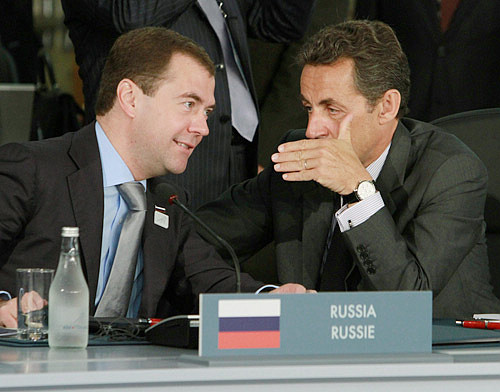|
 |
|
CATCHING UP: Russian President Dmitry Medvedev and French President Nicolas Sarkozy chat at the fourth G20 summit in Toronto, Canada, on June 27 (XINHUA) |
As for China, it hoped Europe would not head into a second economic meltdown and demand decrease while reducing fiscal deficits. As Europe is China's biggest trade partner, China does not want to see a dramatic slowdown in its own exports because of Europe's tight fiscal policies.
In the meantime, China hopes the United States will make timely moves to adjust its fiscal policy and prevent the dollar from entering medium- or long-term depreciation, or debt monetization, while continuing to promote economic growth, employment and consumption.
For developed countries, strengthening financial supervision is one of the topics that concern most. At the London and Pittsburgh summits, the United States and European countries paid too much attention to constraining financial executives' salaries, regulating hedge funds and cracking down on tax havens.
Agendas proceeded the same way at the G20 Finance Ministers and Central Bank Governors' Meeting in Busan, South Korea from June 4-5, the preparatory meeting for the Toronto summit.
Debates on whether or not to impose a banking tax worldwide, a topic brought up by the United States, stole attention away from what should have been the main topic, the European debt crisis. The reason the United States and European countries put so much emphasis on financial supervision is in the awareness of drawing lessons from the financial crisis. But it is also because they wanted to maintain the existing international financial system.
But emerging countries such as China do not hold the same views. As far as they see it, the best measure to prevent a recurrence of the financial crisis is to launch a comprehensive, thorough reform of the international financial system.
Since the G20 summit was inaugurated two years ago, developed countries have been forced to adjust the quota share and voting power at the International Monetary Fund (IMF) and the World Bank, as strongly requested by emerging economies as well as other developing countries. But these adjustments only resulted in limited reductions.
These slight adjustments were disproportionate to the emerging countries' strength in the current international economic system. What's more, they did not fundamentally change the dominance of developed countries—especially the United States in the IMF and the international monetary system.
Promoting trade and investment liberalization and avoiding protectionism were also major topics of the summit. Since the rapid deterioration of the world economy at the end of 2008, trade protectionism has been on the rise.
In 2009, restrictive trade policies increased worldwide. And trade barriers also increased. China became the main victim in this wave of trade protectionism.
Many scholars pointed out, although trade protectionism would not become mainstream, it severely threatened global trade balance and economic recovery, as it sacrificed the interests of other countries.
Currently, the sovereign debt crisis continues to spread in Europe and it faces the threat of economic slowdown and even a "double-dip recession." If trade protection measures and trade barriers become more severe, the world economy will deteriorate again.
Against this backdrop, it seems extremely important to abandon trade protectionism and truly open the door of free trade to the world.
China's role
Since China adopted the reform and opening-up policy in 1978, the Chinese economy has enjoyed sustained growth, thus gaining an increasingly important position in the world economy. But China still has an only limited say in international economic affairs.
The World Trade Organization, the World Bank, the IMF and other international institutions China has participated in, are all dominated by developed countries—not to mention the G8, which is known as "a rich nations' club."
But things are different in the G20, where China has rid itself of its passive position in world economic rule making and participates in the solving of major global economic issues as a full member, together with other emerging economies.
China's voice and image appeared in every part of the G20 summits, from welcome banquets to plenary sessions and the issuing of joint declarations.
Chinese President Hu Jintao made speeches at all four summits. He expressed—to participating countries as well as the world—China's stances and views on a series of key issues including dealing with the international financial crisis and strengthening international cooperation. During the summits, China attracted great attention because of its role and influence.
The reason China can play a bigger role within the framework of the G20 is not only in the support of other countries, especially mutual support of emerging economies, but also in the fact China has played positively the role of a responsible power.
China first solved its own problems and then participated in the discussion and solution of global economic problems. For instance, it advocated all countries adopting large-scale economic stimulus measures to contain the crisis, stood against trade and investment protectionism, and urged efforts to improve global economic governance.
In the future, with the institutionalization of the G20 mechanism, China's status will be further strengthened. It will enjoy a bigger role, especially in the reform of international institutions. China should try to gain a greater say for emerging countries in this respect.
Nevertheless, within the G20 framework, the international community—especially Western countries—tends to expect too much from China. They expect the country to take on international obligations beyond its ability.
China, meanwhile, finds it is a hard path to travel to put into practice various reforms in the interests of developing countries in the global financial and economic systems, where the United States and European countries enjoy absolute dominance.
China also realizes it cannot shoulder a burden beyond its actual capacity, while participating in G20 affairs.
The author is a research fellow with the Institute of Finance and Banking of the Chinese Academy of Social Sciences | 